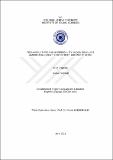Please use this identifier to cite or link to this item:
http://hdl.handle.net/11547/1417Full metadata record
| DC Field | Value | Language |
|---|---|---|
| dc.contributor.author | Yanar, Muhsin | - |
| dc.date.accessioned | 2019-04-18T07:02:23Z | - |
| dc.date.available | 2019-04-18T07:02:23Z | - |
| dc.date.issued | 2018-06 | - |
| dc.identifier.uri | http://hdl.handle.net/11547/1417 | - |
| dc.description.abstract | 21. yüzyılda ‘gerçek’ ile temasın birçok açıdan koptuğunu ve bu durumdan zevk aldığımızı, tarih anlayışımızın tamamen kaybolduğunu ya da başka anlayışlarla yer değiştirmeye zorlandığını, tüketim toplumunun hâkim olduğunu, ‘gerçek’ olandan ziyade onun kopyasının ve kopyasının da kopyasının ‘gerçek’i belirlediğini, medya araçlarının kitleleri yönetme ve yönlendirmedeki baskın gücünü birçok postmodernist yazar, kuramcı ve eleştirmen dile getirmekte ve tartışmaktadır. Özellikle içinde bulunduğumuz yüzyılda dünya çapında kitleler medya teknolojileriyle yönetilip, reklam, film, TV dizileri ve benzeri içeriklerle tüketmeye yönlendirilmektedir. Tüketim ihtiyaç kavramından çıkarılıp tamamen doyurulamayan bir arzu ve sınırsız isteğe dönüştürülmüştür. Bu durum bireylerin kendi benlik ve kimliklerini unutarak kitle benliği ve kimliğini benimsemesine yol açmış ve öznenin sonunu getirmiştir. Çağdaş toplumsal, politik ve kültürel gelişmelerle yakından ilgilenen günümüz Amerikalı yazarlarından Don DeLillo’nun yazdığı oyun ve romanlarda geç dönem kapitalizm ve kültür endüstrisinin yansımaları, tüketim toplumunun etkileri ve bireyin ölümü öne çıkar. Bunu göz önüne alarak tezimde, Don DeLillo’nun Americana, Great Jones Street ve White Noise adlı romanlarındaki karakterlerin içinde bulundukları fiziksel ve ruhsal halin sebep-sonuç ilişkisini teknokültür ve hipergerçeklik gibi kavramlar üzerinden değerlendireceğim. Romanları genel anlamda postmodernist eleştirel teoriye dayandırıken, özellikle François Lyotard’ın ‘Postmodern Durum’a dair incelemeleri, Jean Baudrillard’ın ‘simulacra’ kuramı, tüketim toplumu ve kitle kültürü anlayışı, Marshall McLuhan’ın medya kuramı, Zygmunt Bauman’ın ‘likidite’, ‘ihtiyaç’, ‘arzu’ ve ‘istek’ kavramlarından yararlanacağım. | tr_TR |
| dc.language.iso | tr | tr_TR |
| dc.publisher | İSTANBUL AYDIN UNIVERSITY INSTITUTE OF SOCIAL SCIENCES | tr_TR |
| dc.subject | Don DeLillo | tr_TR |
| dc.subject | Postmodernizm | tr_TR |
| dc.subject | Hiperrealite | tr_TR |
| dc.subject | Teknokültür | tr_TR |
| dc.subject | Geç kapitalizm | tr_TR |
| dc.subject | Medya teorileri | tr_TR |
| dc.subject | Likidite | tr_TR |
| dc.subject | Tüketim toplumu | tr_TR |
| dc.subject | Metalaşma | tr_TR |
| dc.subject | Don DeLillo | tr_TR |
| dc.subject | Postmodernism | tr_TR |
| dc.subject | Hyperreality | tr_TR |
| dc.subject | Technoculture | tr_TR |
| dc.subject | Late capitalism | tr_TR |
| dc.subject | Media theories | tr_TR |
| dc.subject | Liquidity | tr_TR |
| dc.subject | Consumer society | tr_TR |
| dc.subject | Commodification | tr_TR |
| dc.title | TECHNOCULTURE AND HYPERREALITY IN DON DELILLO’S AMERICANA, GREAT JONES STREET AND WHITE NOISE | tr_TR |
| dc.type | Thesis | tr_TR |
| dc.description.abstractol | In 21st century, many postmodernist authors, theorists and critics point out that the contact with the ‘reality or real’ have been lost and people are fascinated with this loss. Losing the touch with reality also damaged our sense of historicity which has disappeared or forced to be replaced with a superficial perception of the present. The dominant consumerism and proliferation of simulacra have come to define ‘reality or real’. Mass media is chiefly responsible for the proliferation of the images and with its unlimited power, it dominates people’s lives. The masses around the globe in the 21st century are forced to consume the media and their contents such as the Internet, the social media, advertisements, movies, TV shows, and so forth. The dominant ideology of consumption is evident in insatiable desires that are marketed as needs. As a result, in the postmodern age, individuals forget their ‘authentic self’ and assimilate into the masses. Don DeLillo’s plays and novels reflect the effects of the late capitalism and postmodern culture industry that result in the death of the subject. This dissertation looks into the themes of technoculture, consumerism, and hyperreality in Don DeLillo and discusses the physical and psychological causes and effects of these on the characters that appear in White Noise, Great Jones Street and Americana. The arguments developed in this dissertation are based on the postmodern theories of François Lyotard, Jean Baudrillard, Fredrick Jameson, Marshall McLuhan, Zygmunt Bauman and the Frankfurt School theorists’ criticism of culture industry. Baudrillard’s theories of the consumer society and the masses, Marshall McLuhan’s media theory, Zygmunt Bauman’s concepts of ‘liquidity’, ‘need’, ‘desire’, and ‘wish’ and François Lyotard’s explorations of ‘the Postmodern Condition’ constitute the backbone of the discussion. | tr_TR |
| Appears in Collections: | Tezler -- Thesis | |
Files in This Item:
| File | Description | Size | Format | |
|---|---|---|---|---|
| TECHNOCULTURE AND HYPERREALITY IN DON DELILLO’S.pdf | Yüksek Lisans Tez Dosyası | 1.16 MB | Adobe PDF |  View/Open |
Items in DSpace are protected by copyright, with all rights reserved, unless otherwise indicated.
